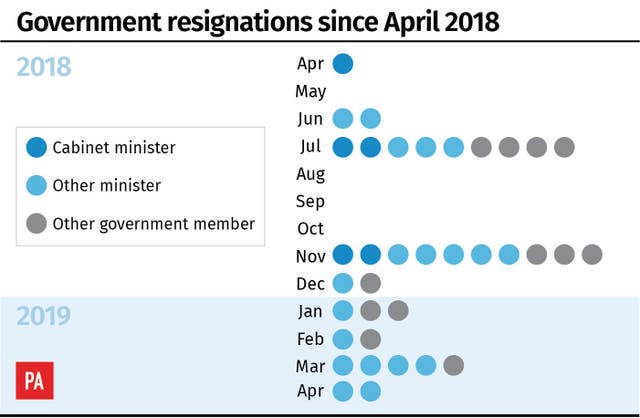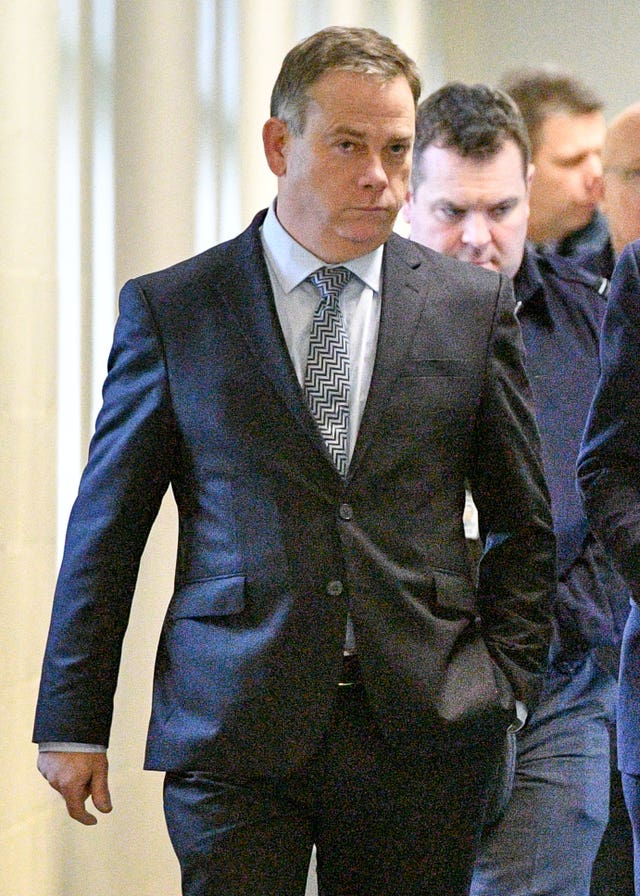Brexit deal talks continue after ‘inconclusive’ meeting between May and Corbyn
The Prime Minister’s decision to reach out to the Labour leader provoked fury among Conservatives and two ministerial resignations.

Talks on a possible compromise Brexit deal are to continue on Thursday after a meeting between Theresa May and Jeremy Corbyn which the Labour leader described as “useful but inconclusive”.
The meeting sparked fury among some Conservatives, with two ministers quitting Mrs May’s Government and a string of backbenchers voicing their anger during Prime Minister’s Questions in the House of Commons.
It followed Mrs May’s dramatic announcement that she was willing to reach out across the political divide to find a deal allowing her to obtain a short delay to Brexit at an emergency EU summit on April 10.
Mr Corbyn said the meeting in the PM’s Commons office was “useful but inconclusive”, adding: “There has not been as much change as I expected”. But in formal statements, both sides described the talks as “constructive”.
A Labour spokesman said: “We have had constructive exploratory discussions about how to break the Brexit deadlock.
“We have agreed a programme of work between our teams to explore the scope for agreement.”
And Downing Street said: “Today’s talks were constructive, with both sides showing flexibility and a commitment to bring the current Brexit uncertainty to a close.
“We have agreed a programme of work to ensure we deliver for the British people, protecting jobs and security.”
It is understood that a planning meeting was taking place in Parliament on Wednesday evening ahead of intensive technical discussions by negotiating teams on Thursday.
Mrs May has said she hopes to find a solution which both leaders can support, or failing that, a system of indicative votes which both will recognise as binding.
In a boost to the Prime Minister, MPs failed in a bid to take over the Commons timetable on Monday for a third round of “indicative votes” on Brexit alternatives, with Speaker John Bercow wielding his casting vote after MPs split 310-310.
MPs voted by a majority of one to allow a cross-party bid to pass legislation to block a no-deal Brexit in a single day on Wednesday, with a majority of five then agreeing to a second reading.
Wales minister Nigel Adams denounced the decision to meet Mr Corbyn as a “grave error” as he announced his resignation from the Government.
The Selby and Ainsty MP – a close ally of Boris Johnson who took part in planning for his abortive push for the leadership in 2016 – told Mrs May in a letter: “It now seems that you and your Cabinet have decided that a deal cooked up with a Marxist who has never once in his political life put British interests first is better than no deal. I profoundly disagree with this approach.”

And Chris Heaton-Harris quit the Department for Exiting the EU with a warning that the PM was being badly advised over the risks of no-deal.
The Daventry MP, whose responsibilities included overseeing no-deal preparations, said the UK would “swiftly overcome” any difficulties caused by quitting the EU without an agreement.
Mrs May’s evident determination to avoid no deal had made his job “irrelevant”, he said.
In a letter of resignation to the PM, he said civil servants had “moved mountains” to ensure a no-deal Brexit could go ahead smoothly, adding: “I do not believe the briefings you have received on these matters recently have reflected all they have achieved.”
Disgruntled Tory MPs were expected to voice their anger at a meeting of the backbench 1922 Committee in Westminster on Wednesday evening.
Leading Brexiteer Jacob Rees-Mogg accused Mrs May of planning to collaborate with “a known Marxist”.
And normally loyal Caroline Johnson was among a clutch of Tory backbenchers at PMQs who spoke out against what she called “the risk of letting down the country and ushering in a Marxist, anti-Semite led government”.

Mrs May told MPs that the purpose of her meeting with Mr Corbyn was “to look at those areas we agree on”.
“I think we both want to deliver leaving the EU with a deal,” she said. “I think we both want to protect jobs. I think we both want to ensure that we end free movement. I think we both recognise the importance of the Withdrawal Agreement.
“What we want to do now is find a way forward that can command the support of this House and deliver on Brexit, deliver on the result of the referendum and ensure that people can continue to have trust in their politicians doing what they ask us to do.”
She also met Scottish First Minister Nicola Sturgeon and Welsh First Minister Mark Drakeford.
Following the meeting, Mr Corbyn said he put forward Labour’s view that “we want to achieve a customs union with the European Union, we want to have access to the market and, in particular, we discussed the dynamic regulatory alignment that is guaranteeing European regulations as a minimum on the environment as well as consumer and employment rights”.
To the fury of some Tories who virulently oppose any involvement in a customs union, Brexit Secretary Stephen Barclay said a softer Brexit was “the remorseless logic of the numbers of the House of Commons”.
Mr Barclay told BBC Radio 4’s Today programme: “If the Prime Minister’s deal won’t go through and no deal in law is taken off the table, then the consequence of that is either a soft Brexit or no Brexit at all.”
He blamed hardliners in Tory ranks for the situation, saying: “It’s regrettable that what we have been saying for several months now is coming to pass, but that is the remorseless logic of not backing the Prime Minister’s deal.”

But Attorney General Geoffrey Cox suggested that it would remain possible for the UK to quit any customs union arrangement after successfully completing Brexit.
Mr Cox told BBC political editor Laura Kuenssberg: “If we decided, in some considerable years’ time, that we wanted to review our membership of any such customs union if we signed it – and I’m not saying we will – that’s a matter for negotiation and discussion.
“There’s nothing to stop us removing ourselves from that arrangement, so we can’t look at these things as permanent straitjackets upon this country.”
European Commission president Jean-Claude Juncker said the EU would accept an extension to May 22 if the UK had approved Mrs May’s Withdrawal Agreement by a “viable majority” before April 12.
But speaking in Brussels, he said a no-deal Brexit at the end of next week was becoming “more and more likely”, adding: “April 12 is the final date for possible approval. If the House of Commons does not adopt a stance before that date no short-term extension will be possible.”





